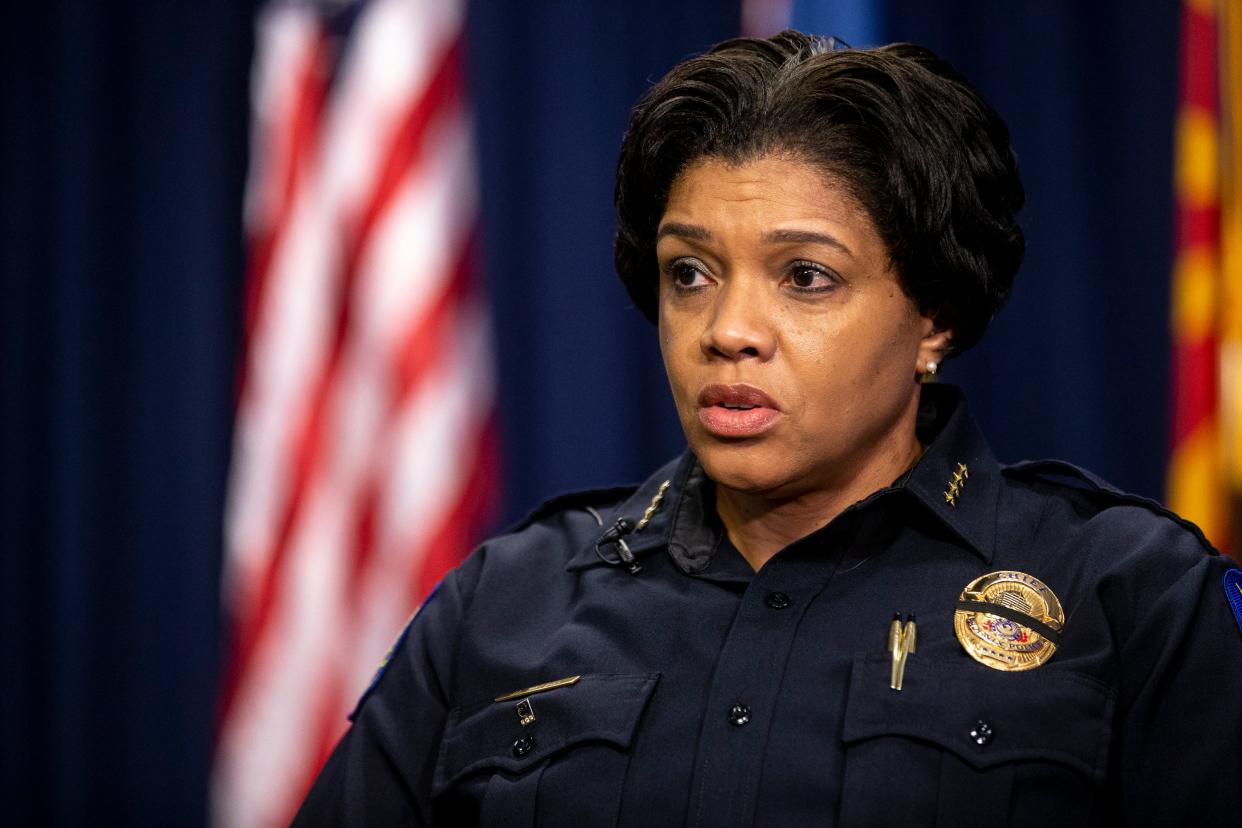Who can fix Phoenix police, if Jeri Williams only made things worse?

Jeri Williams is leaving the Phoenix Police Department in bad shape and with little hope of turning things around any time soon.
Williams, a 33-year law enforcement veteran and the police chief for nearly six years, said she felt the time was right to step aside.
Leaving, she said in a statement, would allow her “the rare opportunity to prioritize family and explore future endeavors.”
No doubt leaving now is good for her – personally. She’s walking away with a good pension and leaving behind the police department’s headaches for others to deal with.
They are no small problems. The department is struggling to fill hundreds of empty jobs. It is facing a federal inquiry over deadly force allegations and multiple lawsuits stemming from bogus charges against Black Lives Matter protesters.
Did Jeri Williams mislead the public?
The list of grievances is long and damning against Phoenix police and Williams’ handling of the arrest and subsequent gang charges (later dropped) against the protesters.
Conspicuously, Williams announced her departure amid media reports over how much she really knew about her top aides’ involvement in slapping protesters with gang-related charges.
Williams told the council that she was kept in the dark and only got a one-day suspension over the fallout. But three then-assistant police chiefs, John Collins, Lawrence Heins and Gabriel Lopez, were demoted and are now suing the city for violating their employment rights.
They claim in their lawsuit that Williams’ top aide, Michael Kurtenbach, knew what was happening. And ABC 15 recently obtained recorded messages in which Kurtenbach suggests Williams misled the city council and the public over how much she knew about the gang charges.
Phoenix police have tough questions to answer
That is just one of the things plaguing the Phoenix police and that the next chief must handle, which prompts several questions at the core of the future of the state’s largest law enforcement agency.
If Williams couldn’t fix the police force, and in many ways made it worse, can anybody do it?
This is an important question because Williams not only fit the profile but had the experience and temperament to transform Phoenix police into a force that the public could trust.
That didn’t happen, despite the fact that she’s a Black woman out of south Phoenix, a predominantly Black and Latino area.
Williams understands these communities because she’s one of them and lives among them. Nobody can accuse her of not being involved in neighborhoods across the sprawling city where many complaints against police originate.
Yet, as I have previously written, she failed to gain the trust of minorities, who make up more than a third of the city’s population and often feel unfairly targeted by cops.
Can the next chief dig the department out of its current hole?
No police chief alone will be able to improve morale within the ranks and regain the public’s trust, no matter their race or law enforcement experience.
Williams proved as much.
She may have had good intentions, but in the end, she faced a multitude of competing interests that have turned the police department into a tug-of-war.
Williams faced a divided City Council with some members promoting the notion that cops can do no wrong and others who want to expose a deep-rooted culture of police brutality, especially against people of color.
Then there’s the powerful police union that has built an almost impenetrable wall into the inner workings of the rank and file.
Williams has some powerful external allies who characterize her as tough on crime and a good steward of the men and women in blue. Her critics, mostly minorities who want greater police accountability for their actions, say she’s part of the problem.
Is Phoenix police doomed, or is there hope?
Phoenix residents, just like others across the country facing similar predicaments, have no choice but to keep fighting for a more equitable public safety force.
The coming political fight isn’t just about what kind of chief should replace Williams but rather what kind of city Phoenix should be moving forward.
Some will want a chief tough on crime that can patrol the city with an iron fist, while others will be looking for a leader who understands the city’s diversity and who’s willing to hold the rank and file accountable.
But don’t forget that Williams fit many of those characteristics and yet is leaving behind a police force in disarray. And while a miracle worker is certainly needed, those also are in extremely short supply.
Elvia Díaz is an editorial columnist for The Republic and azcentral. Reach her at 602-444-8606 or elvia.diaz@arizonarepublic.com. Follow her on Twitter, @elviadiaz1.
Subscribe to get more opinions content.
This article originally appeared on Arizona Republic: Jeri Williams is out. Can the next chief fix Phoenix police?

